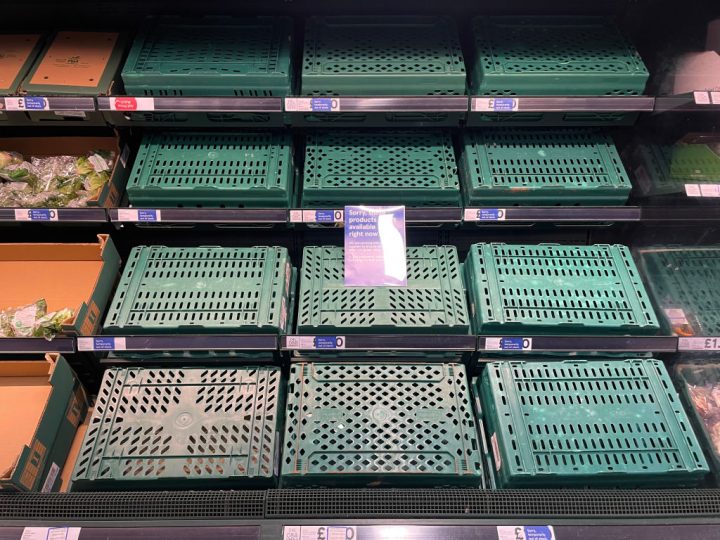It’s funny how powerful a concrete example of something can be, isn’t it? The thing that brings a situation home to where you live. It’s a reminder of how basic, for all our theoretical sophistication, humans really are. Tell someone that bond yields are increasing at an alarming rate, and unless they are a bond trader they won’t feel that alarm in their gut. But tell them that it’s going to be impossible to buy salad in the supermarket, and unless they are Jordan Peterson, they will freak the hell out.
The tomato shortage is what the young folk call ‘relatable content’, and those empty tomato shelves are a political Rorschach blot. You see in them whatever you want to see. Brexit, for instance. I see the sober and sorrowful announcements that they are now rationing tomatoes in Lidl, and hear the angry, defensive claims that it’s ‘a continent-wide problem’.
You could say that no tomatoes may not be the government’s fault: but they are its problem
Then I see the gloating social media accounts of people in Provence, in Hamburg, in Talinn or whatever, in which every corner shop seems to be a cornucopia, and there are people just swimming in great bulbous beef tomatoes of the most sumptuous scarlet. And my instinct, as one of those whiny remoaners, is to yelp: ‘See what you’ve done, you utter clowns? You haven’t created the dynamic, global, outward-looking Britain of your fantasy, but one in which a free-born Englishman will struggle to build himself the cheese-and-tomato sandwich on which he relies for his modest, working-from-home lunch! A pox on you!’
Yet every explainer on the subject I’ve yet read (several of them in outlets not exactly reluctant to blame things on Brexit) says it’s more complicated than that, disappointingly. Brexit is in the mix, in a direct and indirect way. But there’s also energy prices, lousy weather, fluctuating labour costs, striking French dock workers, British supermarkets habitually lowballing their suppliers (meaning we’re back of the queue when the suppliers haven’t enough tomatoes for everyone). Then there’s the lack of resilience in just-in-time supply chains, and – wading so deep into the weeds I started to stumble – something about a pivot from Spain to Morocco, and a dependence on UK importers rather than EU wholesalers, and a Tangiers-Poole freight line that turned out not to exist in the sense most of us define ‘exist’. So it’s horribly complicated, and plural, and chaotic – as most supply chains these days seem to be; and the causes are, as we disciples of the Frankfurt School like to say, overdetermined.
I think that makes it a bit of a teachable moment. It’s not just that most of us will struggle to give a confident answer as to how tomatoes appear on our supermarket shelves of a morning, or don’t: it’s that we don’t, if we’re honest, have the first idea even about the questions that need to be asked. This is true of most of the daily conditions of modernity. We crossly crave simple explanations and yet, thanks to the nth degree of division of labour, we exist amid complexity. The invisible hand doesn’t just fix prices: it produces emergent systems that, in many cases, no single person will fully understand.
Useful and agreeable stuff just appears, as if by magic, and we smile complacently and take advantage of it. Tomatoes are the least of such things. How does the Internet work? All but a handful of the people whose lives now thoroughly depend on it have so little idea we might as well sacrifice a goat when the wifi goes out. And as we’ve discovered more than once, to our cost, even the people whose job it is to run the financial markets don’t actually understand the financial markets.
I do not in any way suggest, incidentally, that it would be much better if we all went back to an age when nothing on which you relied wasn’t comprehensible to its beneficiary: when money was lumps of shiny stuff, everyone could repair his or her own bicycle, eggs came out of named chickens and tomatoes were growing in next door’s greenhouse, or they weren’t. The ‘division of labour’, first locally and then globally, and the subsequent ‘division of understanding how the hell something works’, have reaped humanity very great benefits.
But it makes it ever more difficult for politicians. Everything is so complicated and so little, especially in terms of global trade, is really under their control. The sphere of what these poor saps can achieve is shrinking. It’s not that they can’t bish things up: a butterfly flaps its wings in SW1 and a hurricane blows something flat on the other side of the country. But no matter how cautious they are, they can’t be sure of preventing things going south all on their own.
The causes of this disaster or that one tend to be multiple and brain-wreckingly hard to understand. But as the basic creatures we are, we want to have a single or identifiable cause – which is to say, we’d all very much like to have someone to blame. And since you can’t clamp ‘events, dear boy, events’ or ‘complexity’ in the stocks and throw your last few rotten tomatoes at it, MPs are generally the ones to catch it. So I’ve a certain amount of natural sympathy for Therese Coffey’s view, which boiled down to: ‘Er, eat turnips instead?’
The reactions to that gambit were entertaining, if nothing else. It’s funny to see lots of progressive types who, in usual circumstances, would be the first to tut-tut at eating imported out-of-season fruit on ecological grounds, and would positively relish a righteous recipe for turnip carpaccio, raging at how Brexit has deprived them of international tomatoes. Conversely, the types of people who usually adore global supply chains and the miracles of late capitalism are now feeling warm towards bashed neep salad and Woolton Pie. If it was good enough for the generation that won the war, eh?
And sympathetic though I am to Therese Coffey’s position, it’s a hard one to sell politically. Modernity has a ratchet effect. We have been spoilt, no question, by globalisation and the march of technology. But what was once a luxury quickly becomes a necessity and it’s futile to imagine that the baseline for what we think we’re entitled to expect doesn’t move, and move permanently. Indoor toilets, central heating, not dying in childbirth: these days we regard such things as the necessities of life rather than luxuries, and absent a major civilisational collapse we’re going to continue to do so – especially if we can see that our peers in other first world countries are rolling in such stuff.
You could say, then, that no tomatoes may not be the government’s fault: but they are sure as hell its problem.
Got something to add? Join the discussion and comment below.
Get 10 issues for just $10
Subscribe to The Spectator Australia today for the next 10 magazine issues, plus full online access, for just $10.





















Comments
Don't miss out
Join the conversation with other Spectator Australia readers. Subscribe to leave a comment.
SUBSCRIBEAlready a subscriber? Log in